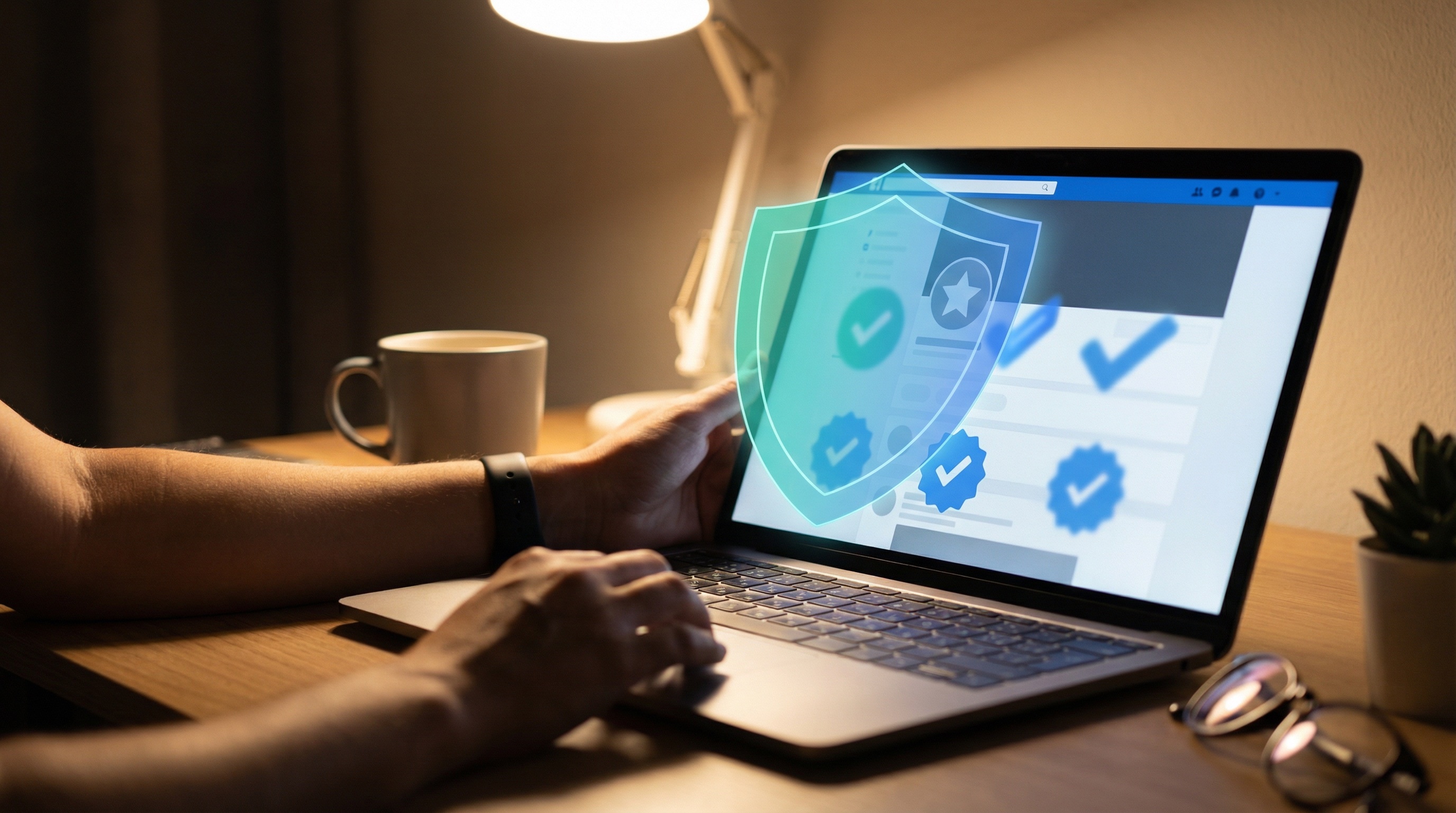Voting scams: How to recognize and avoid election season fraud

Key Takeaways
- Scammers Exploit Election Season: Fraudsters use the excitement around elections to trick people into giving away money or personal information through fake donation requests, bogus surveys, and voter registration scams.
- Deepfakes Are a Growing Threat: AI-generated videos and audio can make it look like real politicians or public figures are saying things they never did, influencing voter opinions or even soliciting fake donations.
- Always Verify Before You Act: Scammers mimic official sources, so always check websites, caller IDs, and emails before sharing personal info, donating, or responding to election-related requests.
- Register & Donate Through Official Channels: Only register to vote through government sites or local election offices, and donate to campaigns directly through their verified websites.
- Stay Skeptical & Use Cybersecurity Tools: Be wary of suspicious election-related messages, and consider using tools that block phishing attempts, fake websites, and deepfake scams.
It's election year, and no matter what your political stance is, we can all agree that voting in a free and fair election is the cornerstone of our society. It's the foundation that supports all the other freedoms we cherish.
While election season is all about casting votes and exercising our basic democratic rights, it's also prime time for scams. We're not just talking about ballot tampering or fixing votes. Scammers don’t care about your political views; they want to swipe your cash and personal info.
In this article, we’ll give you the lowdown on election season scams, what to watch out for, and handy tips to keep you safe. Plus, we'll show you how using cybersecurity software like Guardio can be a game-changer. So, let’s jump in and make sure your vote—and your wallet—stay secure this election season!
{{component-cta-custom}}

Election season scams
Election interference by hackers is nothing new—just think of Russia's meddling in the 2016 US elections or the hacking attempts in 2020
But there's another kind of fraud that hits closer to home and affects people directly: Election season scams. These scams use the election season as a backdrop to trick folks into thinking they're doing their civic duty, whether by donating money, giving out personal info, or participating in fake polls. Scammers use emails, texts, and phone calls to reach out, convincing people to part with their cash or personal details. They then use this info to either steal donations outright or sell personal data on the dark web, where it can be used for identity theft and other scams.
How election season scams work
So, how do these scams work? Well, because we've all become accustomed to getting texts, emails, surveys/polls, and even phone calls from political committees and volunteers, during election season, our guard tends to be down when contacted by scammers pretending to be these trusted sources. Scammers know this and use it to their advantage.
Political donation scams
Scammers posing as representatives from legitimate political campaigns or committees will reach out to ask for donations. They often use sophisticated techniques, like creating fake websites that look almost identical to the real ones or sending phishing emails that appear to be from official sources. These emails might use the candidate’s logos, slogans, and even realistic-looking email addresses. Once you give out your financial information, like your credit card number, scammers can steal your money and potentially use it for other sketchy activities.
Fake surveys/polls
In this scam method, fraudsters contact you claiming to be conducting political surveys or polls. They start with harmless questions about your political opinions to gain your trust. Then, they request personal information like your Social Security number, bank details, or credit card information under the pretense of entering you into a prize draw or validating your responses. This sensitive information is then used for identity theft or financial fraud. Legitimate surveys are usually anonymous and, therefore, will never ask you for personal information.
Voter registration scams
Scammers might call, email, or even visit your home, claiming to be election officials. They could tell you there’s an issue with your voter registration and request personal information to resolve it. Alternatively, they might offer to register you to vote for a fee. It’s important to remember that genuine voter registration is always free, and officials will never ask for sensitive information like your Social Security number over the phone or via email. If you’re unsure, contact your local election office directly to verify any claims.

Deep fake election scams
As technology continues to advance, scammers are finding new ways to deceive voters. One of the newest and most concerning methods is the use of deepfakes. Deepfakes are AI-generated videos or audio recordings that convincingly mimic real people, making it appear as though they are saying or doing things they never did. This technology has become increasingly sophisticated, and it poses a significant threat during election season.
How deep fake election scams work
Scammers use deepfakes to create realistic videos or audio clips of politicians, celebrities, or other public figures. These fake recordings can be used to:
Spread misinformation: Deepfakes can be used to spread false information about candidates, political parties, or election processes, undermining trust in the democratic system.
Influence voters: By creating fake endorsements or statements, scammers can influence voter opinions and decisions, potentially swaying the outcome of an election.
Solicit donations: Deepfakes can impersonate trusted figures asking for campaign donations, tricking people into giving money to fraudulent causes.
Create panic: Fake videos of public figures announcing false emergencies or significant political changes can create panic and confusion among the electorate.
How to protect yourself from voting scams: Election security measures
Election season is prime time for scammers, and this year is no exception. With advancements in technology, especially AI, scammers have become more sophisticated in their tactics. Here are some bulletproof election security measures that’ll keep you safe during this election season:
- Verify sources: If anyone contacts you claiming to be from a political committee or a government representative, always check the credibility of the source before believing or sharing any voting information. Trusted news outlets and official campaign websites are reliable sources of information.
- Be skeptical: If you see a shocking or controversial video, be skeptical and seek out information that confirms the news from multiple reputable sources.
- Look for signs: Email phishing voting scams, bogus websites, and deepfakes often have subtle inconsistencies, like fake logos, bad design, and grammar mistakes. When it comes to deepfakes, look for unnatural facial movements, odd lighting, or mismatched audio and visual cues. Pay attention to these details.
- Use technology: Tools and software designed to detect deepfakes are becoming more available. Utilize these resources to verify the authenticity of suspicious content. Additionally, cybersecurity software like Guardio can come in handy, as it will give you a heads up if you ever receive email phishing voting scams or sketchy texts and block fake websites that aim to steal your cash and info. If you happen to land on a fake voting or registration webpage, Guardio will immediately block it and keep you safe.
This is how Guardio can keep you safe this election season:
- Block fake voting registration websites
- Filter out SMS phishing election fraud
- Alert you of phishing emails
- Notify you immediately if your data is compromised
{{component-cta-custom}}
- Report suspicious content: If you come across any suspicious content, report it to the platform on which you found it and to relevant authorities.
- Be suspicious of calls: Be suspicious of calls providing election information, and verify details with your local election office. Don’t rely on Caller ID, as scammers can spoof numbers.
- Register to vote safely: If someone claims you’re not registered to vote and offers to register you by phone, hang up. You can only register online, by mail, or in person at a local election office. Avoid unsolicited links and register to vote at a government location or by mail.
- Donate through certified websites: Donate to candidates through their certified websites only. Avoid links in emails or texts, even if they appear trustworthy.
- Check PAC registration: Verify if a Political Action Committee (PAC) is registered on the Federal Election Commission’s website. Report scam PACs to your local FBI field office and ask to speak to an election crimes coordinator.
Deepfakes and other election scams represent a significant challenge in maintaining the integrity of elections. Whether you receive voting information via email, text, or website, if you're ever in doubt about its legitimacy, use Guardio. Guardio blocks fake websites and alerts you to SMS phishing, election fraud, and sketchy emails, so you never need to worry about sketchy online election scams.
{{component-tips}}
A few seconds of verification can save you from falling into a voting scam trap. Always double-check before you act!
The bottom line
Election season is crucial for democracy, but it's also prime time for scammers. As technology has advanced, so have the tactics used by fraudsters to steal personal information and money. So, remember to register to vote only through official channels, verify election information with your local office, and be cautious of unexpected calls. For donations, visit certified websites directly and avoid links in emails or texts.
No matter where you get your voting information, if you’re ever unsure about its legitimacy, rely on Guardio. Be cautious this election season and protect both your vote and your wallet.
{{component-cta-custom}}








